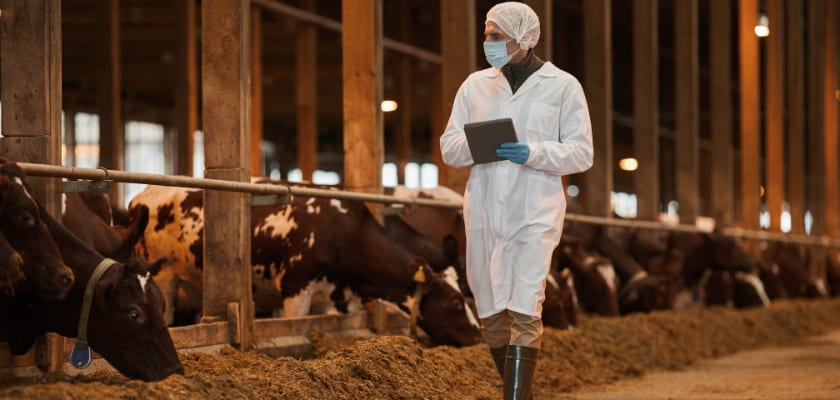Protect yourself and your workers from hazards with the proper PPE

Originally published in Milk Producer, September 2024
When it comes to health and safety on the farm, we often focus on critical or life-threatening injuries. However, each year in Ontario, more workers suffer from occupational illnesses than injuries. “There are many hazards on a farm that can cause serious illnesses. Using the proper personal protective equipment (PPE) is the best way to protect ourselves from them,” says Ryan Dick, Health and Safety Consultant with Workplace Safety & Prevention Services (WSPS).
Ryan grew up on a farm in eastern Ontario and has seen first-hand what can happen when someone is exposed to a biological hazard. “I knew a farmer who was hospitalized after contracting Coccidiosis—a gastrointestinal illness—while working on his farm,” he recalls. “Farmers are constantly working with biological material that can make them sick if not handled properly. We need to take the same precautions that we take when working with chemicals.”
What can make us sick?
Barns, feed rooms, and grain storage areas are a few of the places where you are bound to encounter biological hazards. Mould and mildew are perfect examples. They may not have a Workplace Hazardous Materials Information System (WHMIS) label or a safety data sheet (SDS) to consult, but exposure can be just as much of a risk as any chemical. “Unfortunately, I know several farmers who developed Farmer’s Lung after years of inhaling the spores in the dust from hay and grain,” says Ryan. “Anytime you start to move around grains or hay that have been sitting for a while, you will have potential exposure to mould and other irritants if they become airborne when disturbed.”
Another common biological hazard found on farms is Orf virus. If you have a cut on your hand and touch an animal that has the Orf virus, you can contract Orf disease (sore mouth disease). You can also contract it by handling tools and equipment, such as feeding tubes or shears, that have been used with infected animals.
“We can’t overlook noise,” says Ryan. Noise-induced hearing loss is one of the leading occupational illnesses reported in Ontario. From loud animals to tractors and other farm equipment, farmers are exposed to hazardous levels of noise all the time. “Once hearing loss has occurred, it’s usually permanent,” warns Ryan.
How do I protect myself and my employees?
Using the right personal protective equipment (PPE) is the best way to protect yourself and your workers from exposure to biological hazards and noise. Train your workers on how to properly use, inspect, and maintain their PPE. Follow these tips to keep everyone healthy.
- Wear gloves—Anytime you are working around animal fluids or waste, make sure you are wearing gloves. Nitrile gloves are a good choice to protect against bacteria and viruses.
- Wear respirators—Inhaling mould and mildew on a regular basis can lead to serious allergic reactions and lung diseases. An N95 respirator is usually adequate to filter out particulates in the air.
- Use hearing protection—Noise-induced hearing loss occurs gradually when you are repeatedly exposed to high levels of noise. By the time you realize that your hearing has been damaged, it is already too late. Remember that it’s not only machines and equipment that are loud. Animals—especially when there are several of them in an enclosed space—can also produce hazardous levels of noise. “I always wear hearing protection when I’m in the kidding barn,” says Ryan.
- Wash hands and clothes thoroughly—Even if you’re wearing gloves while working, wash your hands before you eat, use the washroom, touch your face, or enter your home. Remove your work clothes before going inside your house and wash them separately. “Don’t go home and sit on the couch in the same clothes you wore while working in the barn,” says Ryan.
- Wear rubber boots—Just as gloves will protect your hands from exposure to biological hazards, rubber boots will protect your feet. Steel-toed rubber boots offer even better protection.
“Human health is very much tied to animal health and vice versa,” Ryan points out. Take care of your animals, your workers, your family, and yourself.
The information in this article is accurate as of its publication date.




